
archives for 01/2018
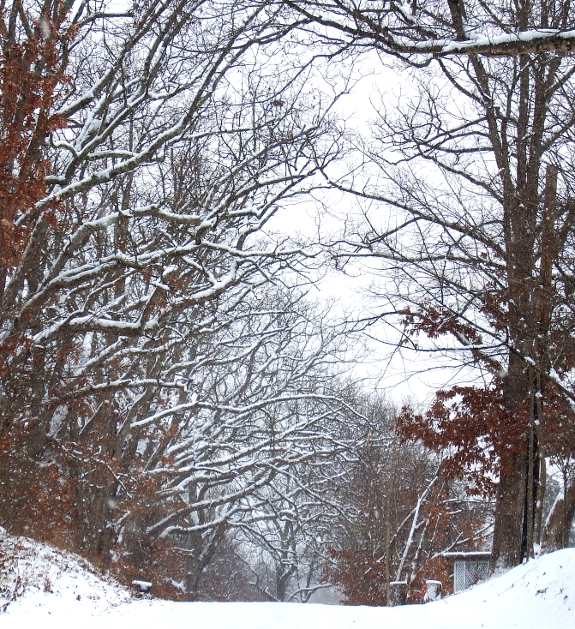
I tried to write a post
containing highlights of 2017...but many events of last winter and
spring are simply too raw for me to even skim past. So, instead, here
are my goals for 2018 --- both simpler and more difficult than they at
first appear.
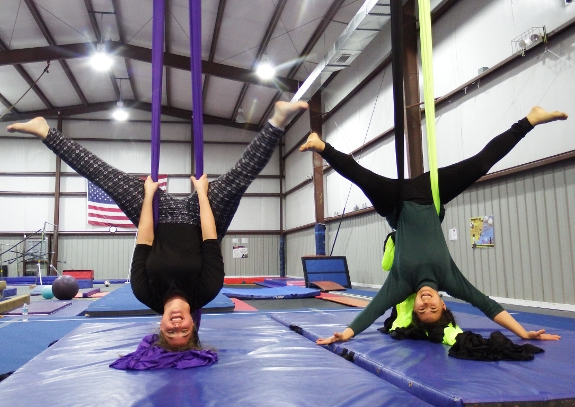
First and foremost, I
plan to continue bringing my life more into balance. Left to my own
devices, I work until I drop. But my body isn't as young as it used to
be, and both physical and mental resiliency require more work than they
used to take.
The prescription?
Incorporate more fun into my life! I'm carefully backing off on
production goals in most most areas of my life by approximately 10%,
penciling in holidays weeks and months in advance. So far, this method
of making me take time off has actually worked. Next step --- continue
to plan rejuvenating activities to fill in those gaps.
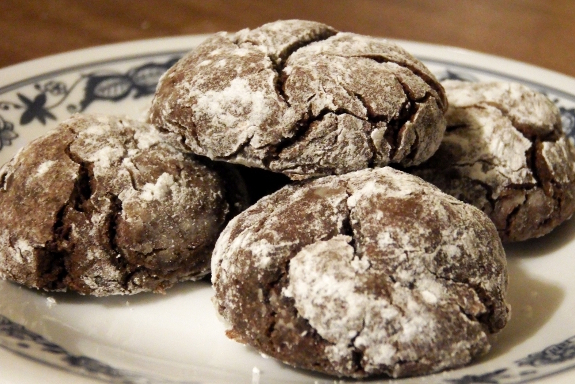
One of the biggest goals
of our move was finding our "tribe" --- likeminded people with whom we
have lots in common. To that end, we're working as quickly as my
introversion allows to meet our neighbors, attend interesting events in
town, and insinuate ourselves into organizations that will help us
build a more resilient community.
As is usual for me,
doing something hard becomes more realistic when I set a quota --- two
socializing events per week. Three months in, I already know more
people in the community than I did after ten years in Virginia without
this goal (although the in-depth relationships will take quite a bit
more time to build).
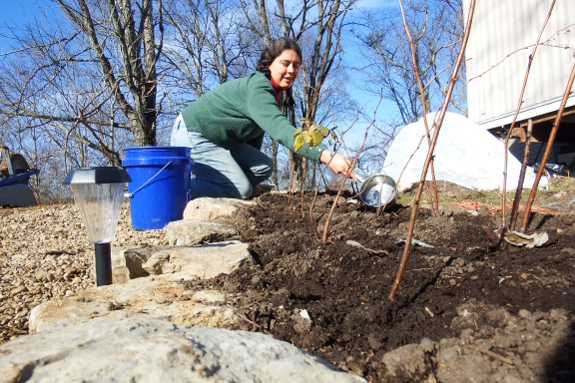
In terms of our homestead (the point of this blog --- I know!), my goal is to get zones 0 and 1 in order in 2018. That will likely include skirting, installing our wood stove, replacing windows, installing rainwater catchment, and building garden beds along our most frequently used paths.
Since one of our favorite neighbors decided not to move away after all (yay!) we might put our own chicken acquisition on hold. But I can't live without a garden, so we'll prioritize getting that up and running ASAP. The trick will be making sure its size stays in line with resolution number one....
Happy New Year! I hope your dreams are both realistic and bright! May your skills grow with the enroaching darkness and may the most important elements of your life fill you with joy.
The roads were clear enough to get our New Year's Day delivery from Lowes.
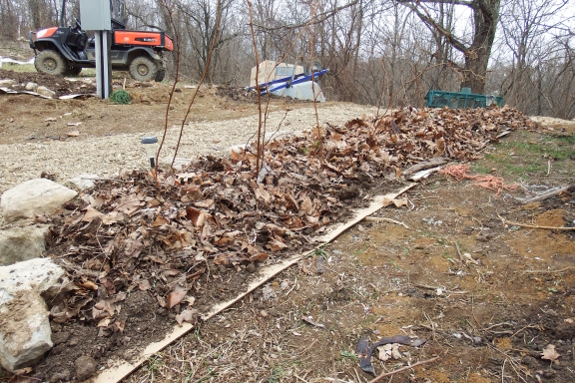
In the midst of this
crazy cold spell (which the locals tell me is unusual at least in its
duration if not in its intensity), I'm glad I took an hour during
December's pretty weather to mulch down what
plants I currently have in the ground. Raking leaves out of the
woods took more effort than expected since the organic matter had
already started rotting down into heavy leaf mold, but that same
heaviness will likely hold them in place in the windier conditions up
here on the ridge.
Will snow cover plus
leaf mold protect roots that only had two weeks to get established
before being whacked in the face with negative 4? I won't know until
spring, but I can sure hope so!
Step one in our under pinning project was to chip away the frozen ground.
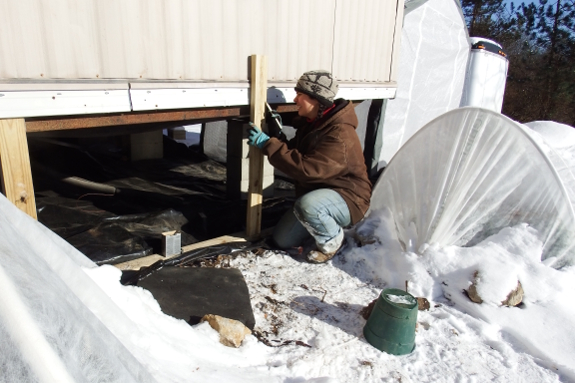
We waited until the sun
was high in the sky and the maximum daily temperatures were tipping up
into the mid teens before starting to work on our skirting, but Mark
and I still only managed about two hours outdoors before our senses
dulled.
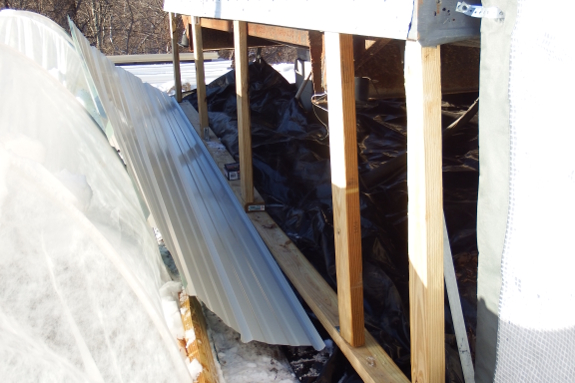
Still, those two hours
gave us time to frame up one (short) end of the trailer. We used
treated 2X4s on top of the black plastic that underlays the entire
trailer, then added uprights every four feet for attaching insulation
and tin.
Next up --- cutting the
metal to deal with the slant of the ground and figuring out attachment.
Details to come in tomorrow's post!
Anna asked me to set up her foldable laptop desk stand but the
only set up needed is adjusting it to the desired height which is super
easy by pushing on the release buttons and clicking it into whatever
angle you need.
It also comes with two hefty
cooling fans to help keeps things cool.
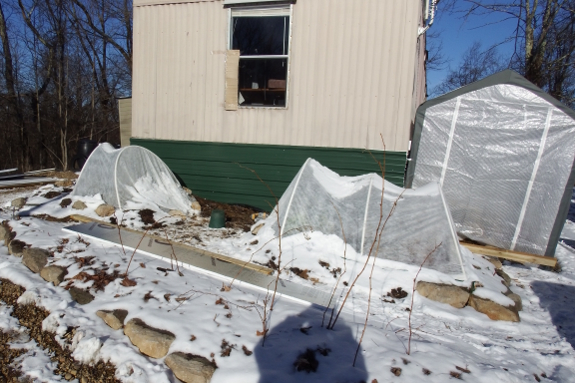
There's a big difference
between a still, sunny 16 and a breezy, cloudy 14. Since the weather
soon morphed from the former to the latter, the photo above shows the
entirety of the skirting
we got done this week.
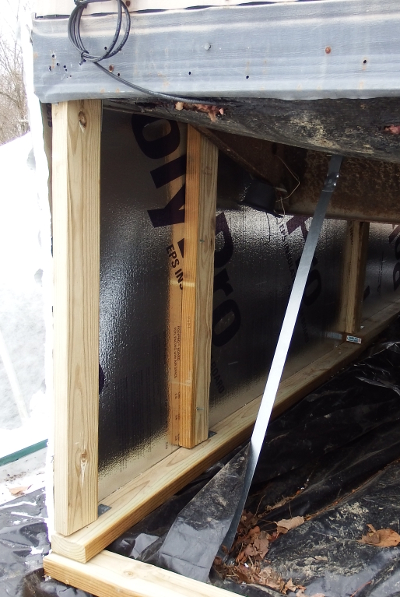 In this second photo, you can
see the back of the skirted side. We ended up sandwiching the foam
insulation between metal and studs rather than attaching the insulation
to the back of the boards (as recommended to get optimal R value).
In this second photo, you can
see the back of the skirted side. We ended up sandwiching the foam
insulation between metal and studs rather than attaching the insulation
to the back of the boards (as recommended to get optimal R value).
The trouble with the second option is the complication of fully sealing
in the air space given the I beams and other complications of the
frame. We can always come in and add styrofoam on the backside of the
boards for extra insulation at a later date if we so desire. But, for
now, I figure we did pretty good given the extreme cold.
Coming up next week ---
doors and vents. Stay tuned!
The greenhouse needed to be moved to make room for the under pinning project.
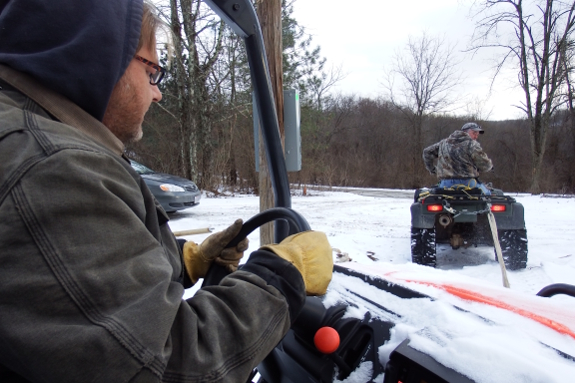
We made a deal with
someone who wants to buy our Kubota quite a while ago...then the deep
freeze hit and the diesel engine refused to start. It's tough to sell a
"no, really, it's running perfectly" vehicle when the engine won't turn
over, so the sale was put on hold until the thaw.
Enter our neighbor, who
showed up in our lives a couple of weeks ago during a snow storm. I was
out walking and enjoying the scenery; he was out scraping people's
driveways with the blade on the front of his ATV.
"Want me to scrape your
driveway?" he asked.
"How much do you
charge?" I replied.
The neighbor looked at
me like I was nuts --- clearly, the joy of scraping snow was payment
enough. Nonetheless, I pulled out some excess Christmas cookies I'd
stashed in the freezer and paid him in sugar and chocolate.
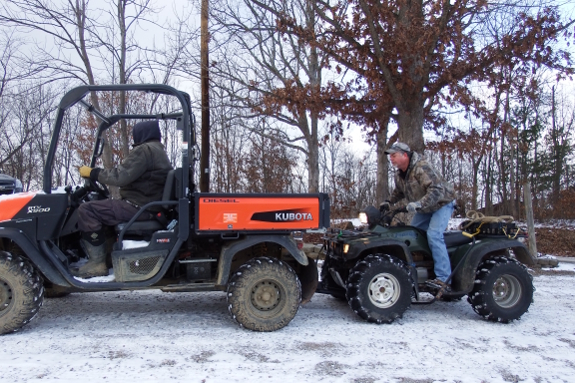
Soon thereafter, Mark
and I received an invitation to come over for a New Year's eve party.
One thing led to another...and soon the guys had cooked up a scheme to
drag the Kubota over to their heated garage to thaw.
Our neighbor arrived
with the same snow blade on the front of his ATV. First he pulled, then
he pushed, and soon the Kubota was in the heated splendor she
rightfully deserved.
Impatient to get her
fired up as quickly as possible so he could take a joyride, our
neighbor pulled out the air filter to increase the amount of hot air
flowing through the system, raised the bed for the same reason, then
took a hair drier to the fuel lines. In less than an hour she roared to
life.
Unfortunately, that
means Mark will have to part with his baby sooner rather than later. On
the plus side, we met some awesome neighbors as part of the deal. I
find it hard to believe that every neighbor we've met thus far has been
interesting and welcoming, but so far that has indeed been the case.
The Kubota X900 found a new
home yesterday.
I was a little sad to see her
go but her new owner promised to treat her good.
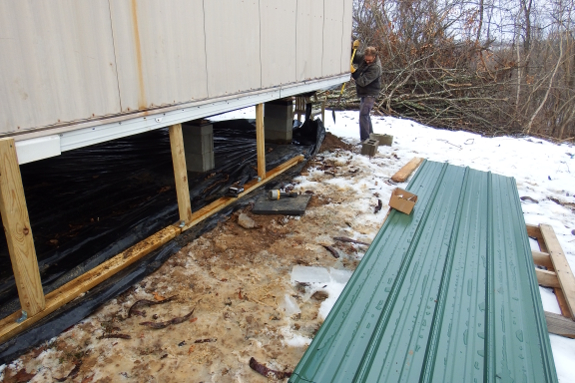
There's nothing quite
like a round of adversity to make you appreciate how good you have it.
With temperatures rising above freezing for the first time in over a
week, diving back into the
skirting project
became a breeze. Without even pushing ourselves, Mark and I managed to
frame up one long side of the trailer in two afternoons.
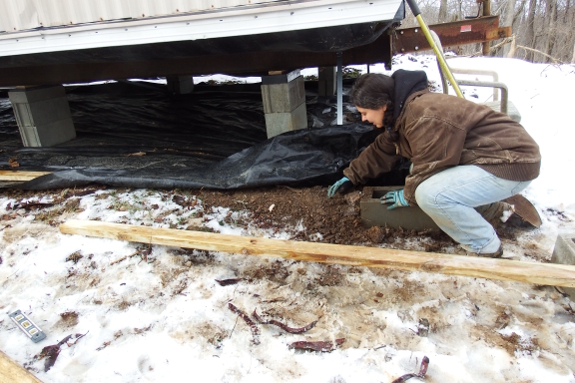
The hardest part about
the framing endeavor is the fact that the ground isn't entirely even
along the trailer's length. Mostly, we dug out to make smooth
transitions, but at the end Mark built up using a cinderblock instead.
We're taking a bit of
time off to celebrate Mark's birthday today (happy seven squared!), but
hope to put up the metal on that side by the end of the week...just in
time for another cold spell to hit. Maybe blocking the wind will at
least count for something as winter weather returns!
We attached our under pinning vertical supports with these small triple zinc framing angle brackets I found at Lowe's for 58 cents per bracket.
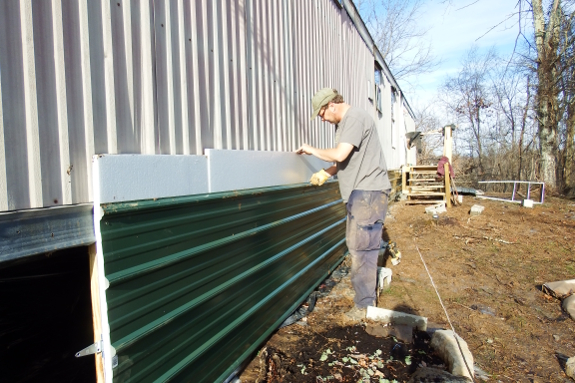
Mark discovered that the
easiest way to get the skirting metal and insulation to come out even is to
measure and cut the former on the ground then to run a knife along the
upper edge of the metal to trim the styrofoam.
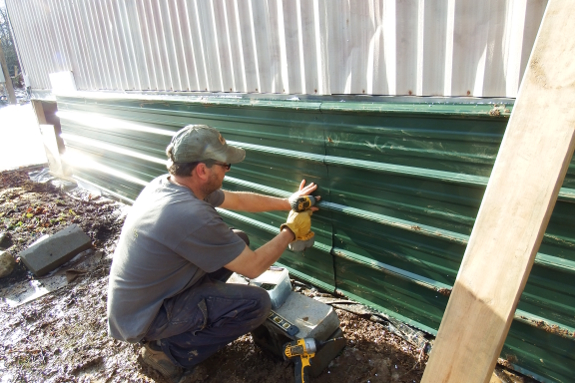
Next up is doors --- the
spot for one of which you can see at the far left of the photo above.
Rather than inserting premade vents into the metal skirting for summer
ventilation, we'll be framing up wooden doors with closable vents so we
can easily get into the various parts of the trailer's underbelly as
well as ensuring accumulated moisture doesn't rot our subfloor.
In case you're following
along at home, here are the rules of thumb for skirting ventilation:
- Plan on one square foot of vent per 150 square feet of trailer (6.5 square feet for a 14x70 singlewide).
- Make sure there's a vent within three feet of each corner.
- Close vents in the winter to keep your pipes warm!
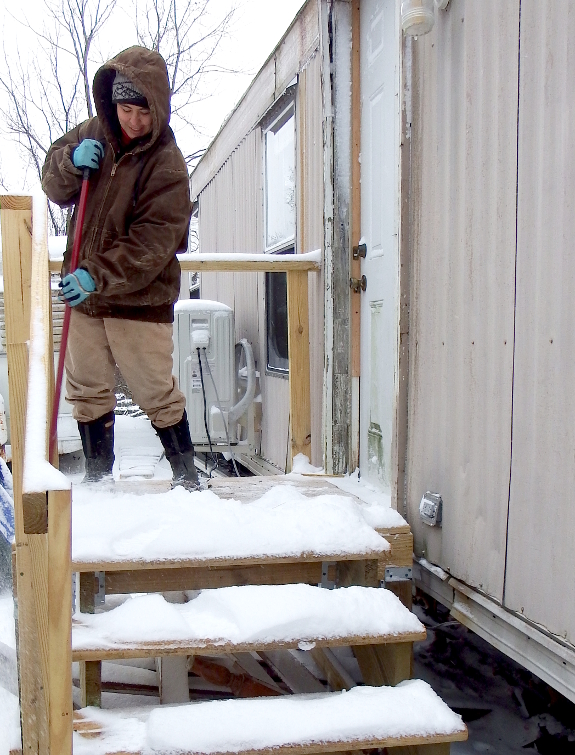
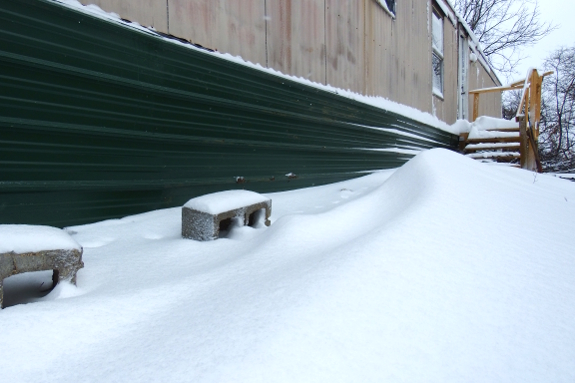
Here's a puzzle for you
--- if a snow drift builds up on the south side of the trailer when
only the south and west sides are enclosed with skirting, what's the
prevailing wind direction? (Guess now --- the answer is in the next
paragraph!)
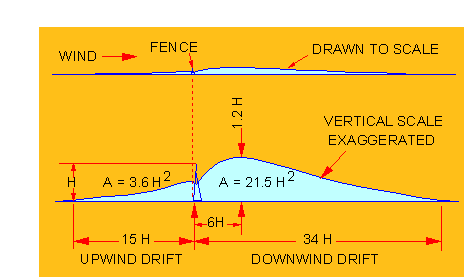 According to the
University of Wyoming,
the trailer is acting like a windbreak, allowing snow to build up on
the downwind
side of the barrier. So, during this storm at least, the winds came
from the north. (Drat!
We chose the wrong half of the trailer to enclose during our warm spell
before the next storm hit.)
According to the
University of Wyoming,
the trailer is acting like a windbreak, allowing snow to build up on
the downwind
side of the barrier. So, during this storm at least, the winds came
from the north. (Drat!
We chose the wrong half of the trailer to enclose during our warm spell
before the next storm hit.)
Is that the prevailing
wind direction? I guess I'll have to pay attention to more snow drifts
this winter and find out!
We used the Malco Heavy Duty Turboshear to cut our metal to size.
It uses the power of any
drill to cut up to 18 gauge galvanized steel.
I figured out the hard way
that it does not cut when it's upside down.
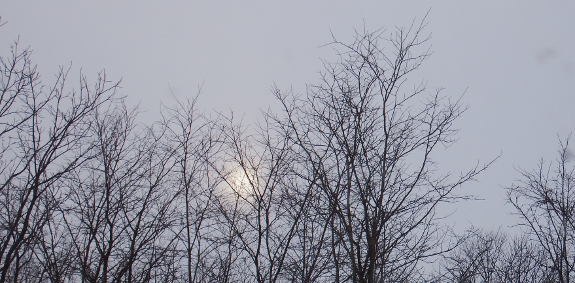
When it looks like this
after lunch, we sometimes decide one hour out in the cold is
enough.
If you're similarly
inclined and need some winter fluff to fill your snow days, perhaps
you'd enjoy snagging my novel Verdant
Magic while it's on sale? This is my most homesteader-friendly work
of fiction --- there are witches and dragon shifters, but also gardens
and goats. Enjoy!
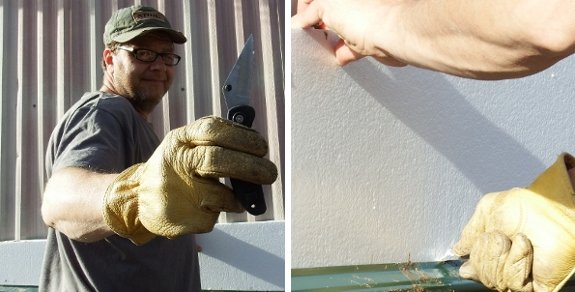
After some trial and error we
discovered the best way to trim the excess foam away on our trailer
skirting project was a simple
serrated pocket knife.
Dealing with the small foam crumbs is a problem when trying to clean up.
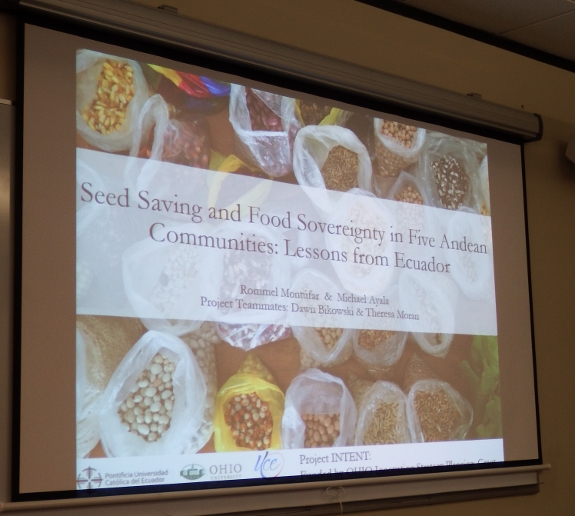
One of the best things
about living so close to a university is the free events we can access
by simply feeding a parking meter. Professor Theresa Moran expanded our
horizons with the movie Bugs --- all about edible insects --- last
fall. And she started 2018 off with a bang by bringing in a duo of
Ecuadorian researchers to regale us with information about seed-saving
in the equatorial mountains.
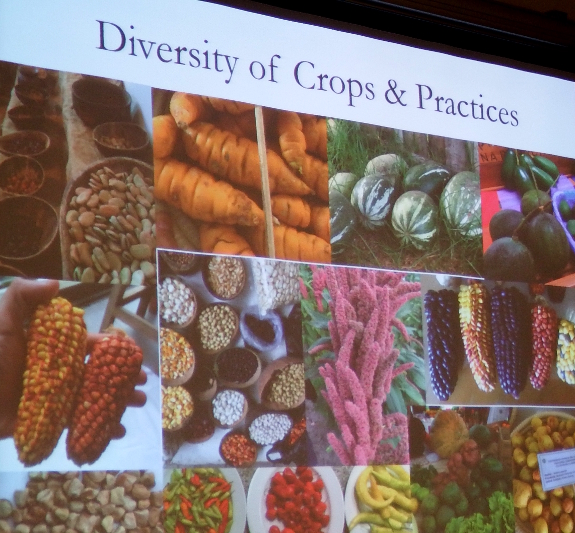
Rommel Montúfar and
Michael Ayala created a vivid image of small to mid-sized mountain
communities in which conventional crops are pushing many traditional
varieties out. Farmers (most of whom were in their sixties, subsisted
primarily on farming, and tended 2.5 acres of ground or less) reported
that their grandparents grew, on average, 83 types of crops in their
gardens. The current generation, in contrast, grows about seven.
Why the change in focus?
Farmers reported that locally saved seeds produced plants that were
tastier, hardier...but less pretty, less productive, and less easy to
sell to a national
or international market. It's hard to stick to the old ways when new
ways bring in immediate cash.
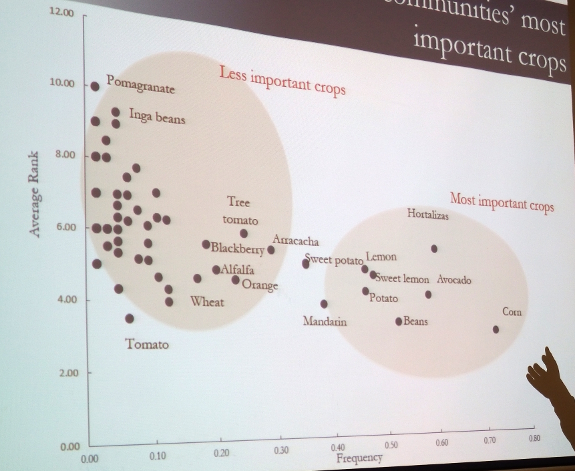
Which isn't to say the
outlook was all doom and gloom. There is still a strong culture of seed
saving and sharing in Ecuador, the latter of which includes both
swapping and simply giving seeds away. For example, an Ecuadorian
farmer never goes to visit a neighbor empty-handed. Instead, she brings
a basket full of the very best she has (often including seeds)...then is sent home with that
same basket full of the very best her neighbors have to offer.
(I'm not using the term
"she" to be politically correct here. About 60% of the farmers involved
the duo's study were women.)
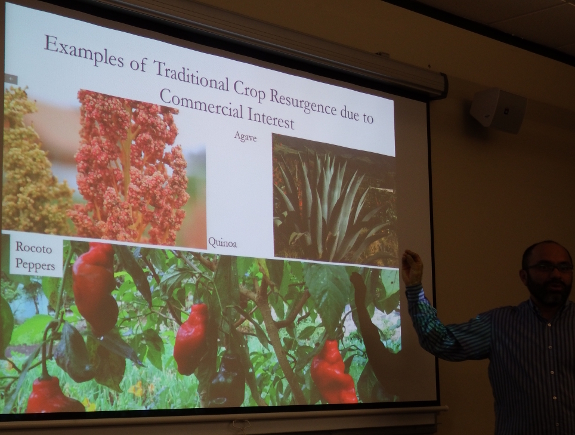
There are also a few
traditional crops that are gaining national and international
importance, thus giving farmers a reason to plant them on a larger
scale. You've most likely heard of quinoa (even though this seed was
nearly unknown outside its traditional stronghold a few decades ago),
blue agave is gaining wide appeal when fermented into tequila, and
rocoto peppers are apparently the hot (pun intended) new pepper of
choice.
My favorite part of the
talk, though, was none of this. Instead, I feasted my eyes on images of
fruits and vegetables I've never seen before. What a treat to enjoy an
Ecuadorian breeze on a frigid Ohio day!
One step in selling the
Kubota X900 was matching up the Vehicle Identification Number (VIN) to
the number on the certificate of ownership.
Put the dump bed in dump
position and the sticker is just above the battery compartment.
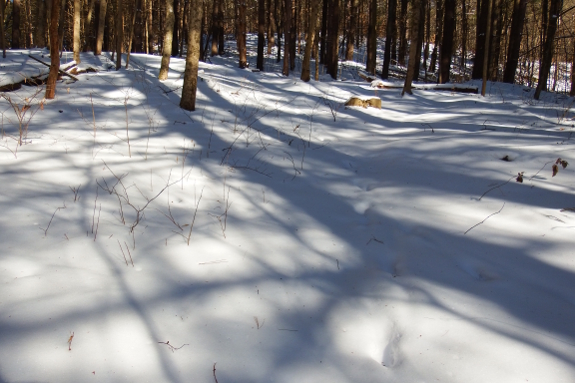
Layer upon layer of snow
fell last week, then we dipped into another
deep freeze. Rather than turn our fingers to icicles, Mark and I spent
most of the week inside, him unpacking and me catching up on items that
had been hanging around at the
bottom of my to-do list for many, many moons.
After I hit my usual
word counts, I decided to try out the new
technology that makes it easy to sell ebooks directly through our
website rather than letting Amazon take their cut. Want to be a guinea
pig to see whether the system is streamlined enough
for prime time? You can save a buck on Homegrown Humus during the
testing period using the button below:
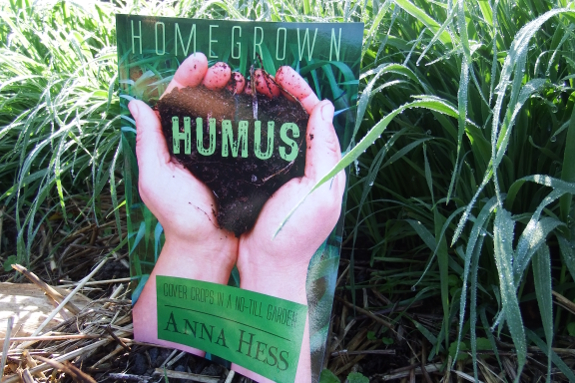
Ebook (epub and mobi)
103 pages
$2.49
(Check your email after buying for a Bookfunnel link)
Homegrown Humus is one
of my favorite ebooks, full of
tips on growing soil fertility for the price of a handful of seeds. You
can read the reviews on Amazon...or just give it a try
using the buttom above.
Don't dilly dally,
though. I plan to raise the price at the end of the week. Enjoy!
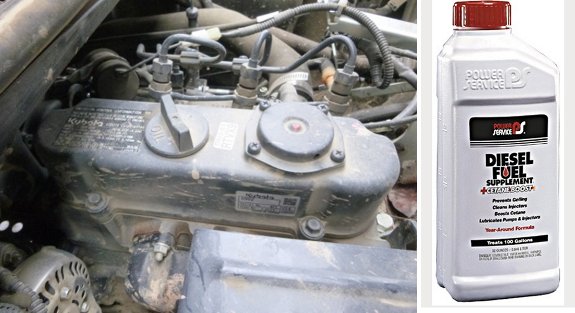
Once we got the frozen
Kubota X900 warmed up and started I added a diesel fuel supplement product to help
prevent another fuel line freeze up.
It got below freezing for a
couple nights but still started without using a hair dryer to thaw the
fuel line.
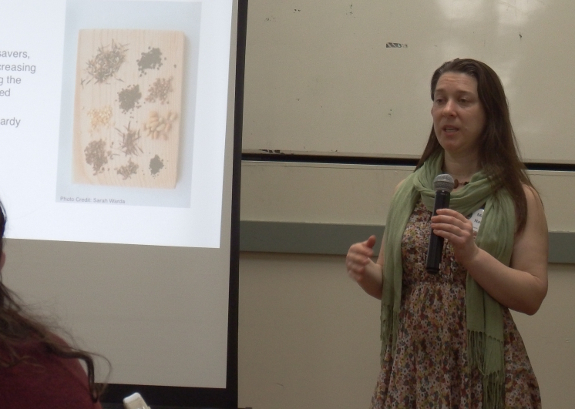
Nowadays, the politics
of seeds mostly has to do with GMO and patented varieties. But the
modern pendulum swing is just the latest in a long line of American
haggling over propagules, as Mary Nally explained in the Community Food
Initiative's Seed to Sustainability Workshop this past weekend.
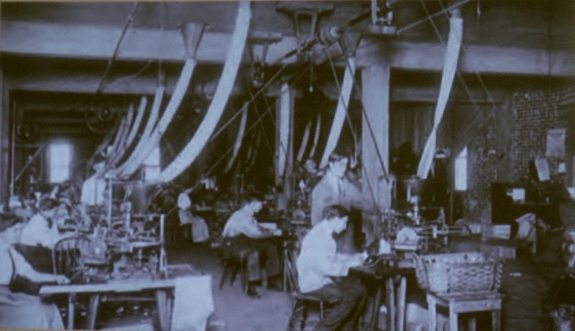
In fact, in the mid
1800s, the US Patent Office devoted 30% of their budget to giving away
free seeds. Over a million packets were distributed to American
gardeners before the nation's budding seed companies stepped in.
"How are we supposed to
make a buck if the government is undercutting us at every turn?" seed
companies complained. By the end of the century, free seeds were
(mostly) a thing of the past.
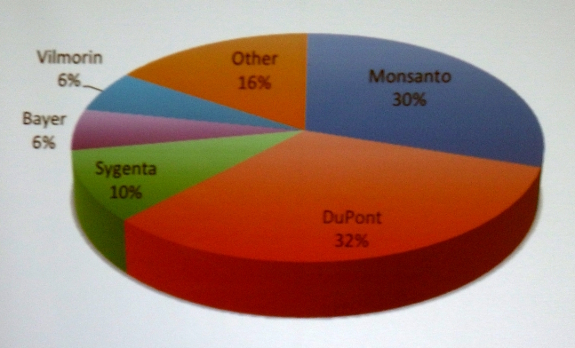
Fast forward ahead to
the early twenty-first century, when three companies controlled 72% of
world seed sales. Various types of patents now prevent you from selling
patented varieties or (in the case of utility patents based on patented
DNA) even saving seeds for your own use. In fact, the Community Food
Initiatives staff were surprised to learn that seed swapping --- that
staple of backyard gardeners in which no money changes hands --- is
technically against Ohio law in many instances.
So what's a gardener to
do? Mary Nally's advice is to work on changing that law. The Recomended
Uniform State Seed Law (RUSSL for short) is a third-party ethical model
that allows seed swaps, seed libraries, and seed banks while still
protecting the economic system that makes the production of new
varieties viable. Several states have already replaced outdated
legislation with RUSSL-based standards. Perhaps Ohio will be next?
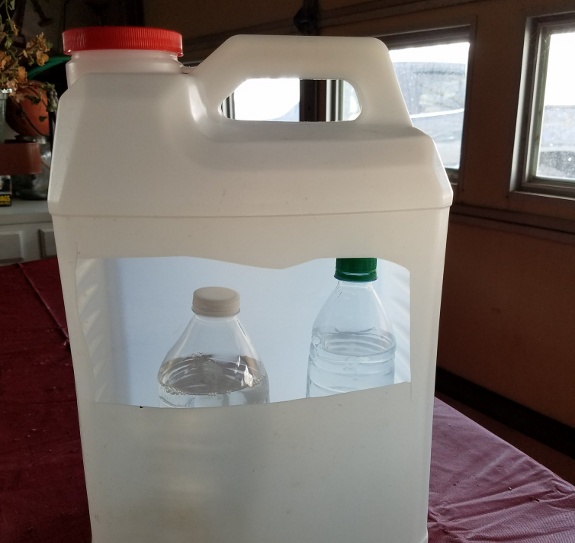
A low tech way of keeping
water from freezing for livestock is to boil a lot of salt into water
bottles and place those bottles at the bottom of a container.
Pour water over top of the bottles keeping them submerged.
My Mom tried this recently
and reports it works at very low temperatures.
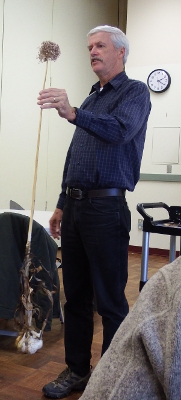 While
Mary
Nally's talk was a wake-up call about what the law tells us we can and
can't do regarding seeds, Ohio University professor
Art Trese's contribution to last weekend's workshop involved what he
calls "hacking hybrids" --- tweaking store-bought seeds to create even
better varieties for your own personal use or even to sell.
While
Mary
Nally's talk was a wake-up call about what the law tells us we can and
can't do regarding seeds, Ohio University professor
Art Trese's contribution to last weekend's workshop involved what he
calls "hacking hybrids" --- tweaking store-bought seeds to create even
better varieties for your own personal use or even to sell.
Having fallen in love
with a few hybrid varieties that stopped being available over the
years, I can definitely see the appeal of hacking those hybrids. But
before you get too excited, here are some hybrids you shouldn't bother
trying to hack: onions, beets, carrots, radishes, turnips, and in some
cases broccoli, cauliflower, and cabbage.
Why steer cleer of those
vegetables? Hybrids of the species listed above are created by choosing
mother plants that are naturally unable to create viable pollen, and
that trait is passed down through the mother's line mitochondrially. In
case you slept through biology class, the upshot is --- for the types
of vegetables listed in the previous paragraph, even raising plants all
the way to maturity won't result in any seeds.
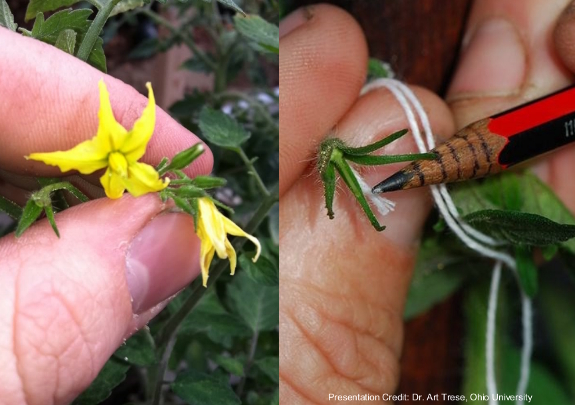
You're likely to have
better luck with your hybrid-hacking efforts if you stick to
tomatoes, peppers, and cucurbits, though, since hybrids of these
species are still made in the old-fashioned way (shown above). Of
course, the offspring of a hybrid will be a mish-mash of variability.
But you can breed together the plants with traits you like the most and
keep doing that for seven generations. At that point, you've generally
come up with an open-pollinated variety that will breed true from those
saved seeds.
And can you sell that
new variety on the open market? You sure can! While it's not kosher to
sell a hybrid's offspring, after the second generation you officially
have something new and legally salable. So feel free to de-hybridize
lunchbox peppers and put their seven-times-great-grandchildren on the
open market. I know I'd buy a set!
Our trailer skirting metal comes in 12 foot sections and some needed to be cut to make room for access doors.
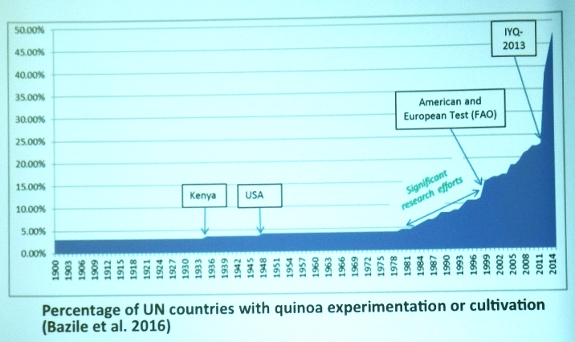
Have you ever tried
growing quinoa? I have. My
first experiment was so abysmally unsuccessful that I never took another
stab at it.
Apparently, I'm not the
only one. Despite a worldwide interest in the high-protein grain over
the last decade, the vast majority of the crop is still grown in the
Andes. Quinoa is simply a finicky species that can't handle high
humidity, high temperatures, or even very mild frosts. So that box of
seeds you see in the grocery store has an 80% chance of having traveled
all the way from South America.
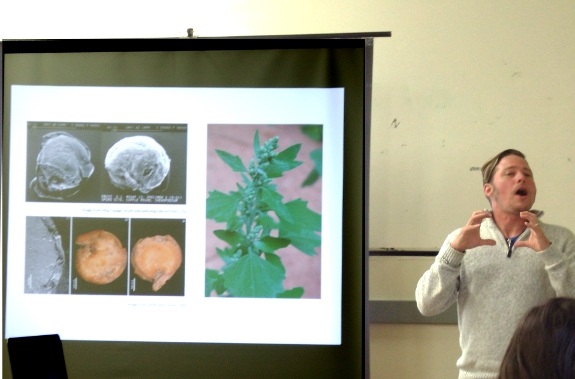
Enter Paul Patton,
professor of arhaeobotany at Ohio University. Dr. Patton got interested
in one of the
so-called Lost Crops that Native Americans grew in our area before corn
traveled from Mexico and took over local diets. It turns out that Chenopodium
berlandieri is in
the same genus as quinoa and would likely be easy to grow in our
region...if any cultivated seeds still existed.
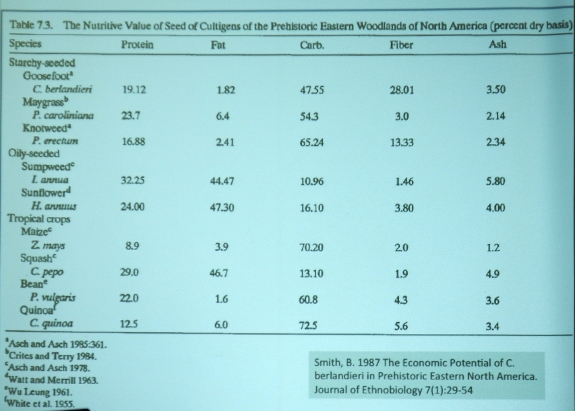
Appalachian quinoa (as
I've decided to dub Chenopodium
berlandieri), is
even more nutritious than its South American counterpart. And the
species can still be found as a weed throughout our area...although the
plants along riverbanks and in farmer's fields have reverted back to
their thick-hulled, small-seeded wild type.
Luckily, Dr. Patton
isn't daunted. He's started a breeding program using the local wild
type plus a bit of cross-breeding with a Mesoamerican variety in the
search for a more edible variety suitable to cultivation. So far, he's
three generations in and is seeing some success. So maybe within a
decade Appalachian quinoa will once again grace Ohio fields?
We considered deleting our trailer towing tongue but chose to work around it compared to cutting through the thick steel.
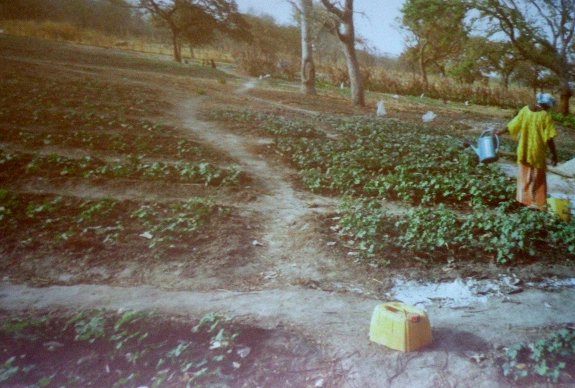
In a complete turnaround
from the high-tech nature of the subjects I've been posting about
recently, Mark and I recently attended a talk about traditional farming
in the subtropical region of southern Senegal (western Africa).
Charlene Hopkins spent 28 months there as part of the Peace Corps prior
to her current graduate studies at Ohio University, and she regaled us
with information about everything from hippo puke to hand watering.
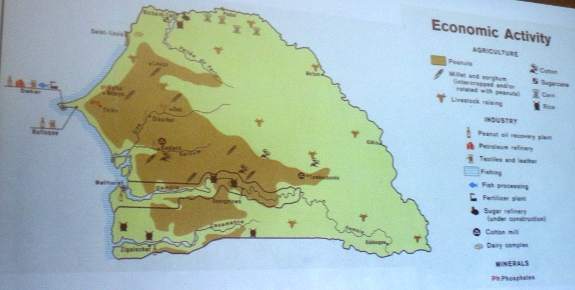
Charlene started with
the big picture. In Senegal, 90% of employed people work in
agricultural jobs...although most people are instead unemployed
subsistence farmers. She lived among the latter, gardening in villages
so poor even creating latrines was a major expense.
There, farmers work hard
from June until October growing and harvesting both row crops
(primarily cotton, corn, sorghum, rice, and peanuts) and vegetables
(like okra, tomatoes, and peppers). But most of the food they grow is
sold to buy the imported rice that keeps villagers alive during the dry
season, so well-rounded nutrition is difficult to achieve.
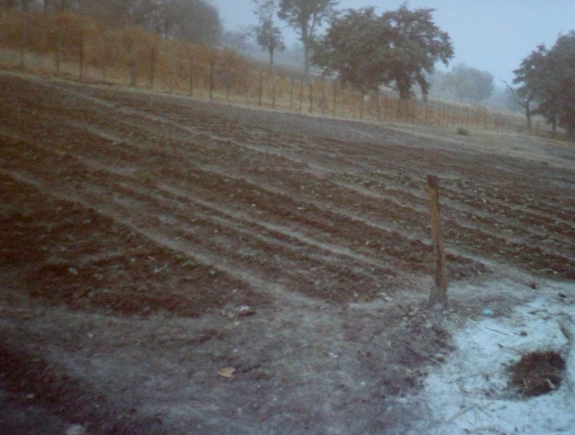
Although I doubt most of
us will choose to follow in the Senegalese's laborious footsteps, there
are lessons to be gleaned from subsistence cultures. Livestock in
Senegal are free ranged and vegetable gardens are fenced to cut down on
the use of supplies. Beds are bite-sized --- typically 2 feet by 8 feet
--- to expedite hand weeding and watering. And gardens are small too,
reaching up to an acre in size for row crops but staying much smaller
for vegetable gardens.
(The image above is a
community garden fenced with the help of the Peace Corps to expand
vegetable growing area for the village.)
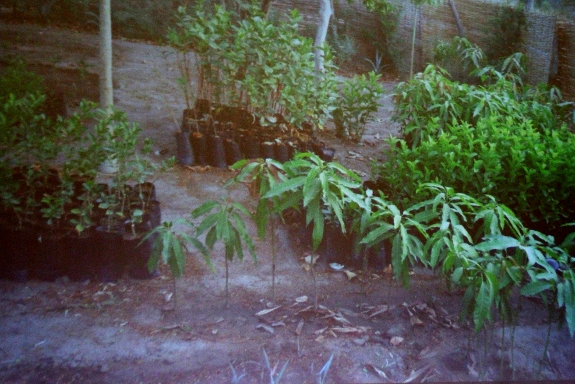
In addition to fencing,
the Peace Corps is helping villagers add more trees to their edible
landscapes. But it sounds like the locals already depended on trees to
some extent.
Mangos have long been
favorites since the large trees provide shade during scorching
afternoons while also bearing fruit for home use and to sell.
Meanwhile, the process of pepineering --- starting seeds in soil-filled
bags in nurseries --- is helping increase diversity into cashews,
bananas, avocadoes, pineapples, and some native fruits you've likely
never heard of.
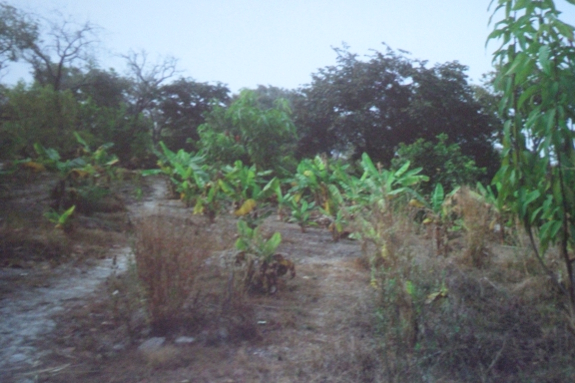
Despite the beauty of
the slides, though, I have to admit my biggest takeaway was gratitude.
Sometimes I take our society's bounty for granted, but I can honestly
say I've never had to choose between vegetables now and rice later. If
you feel similarly and have some cash to spare, you
can donate to the Peace Corps online. I'm sure villages like the
one Charlene visited will appreciate the support!
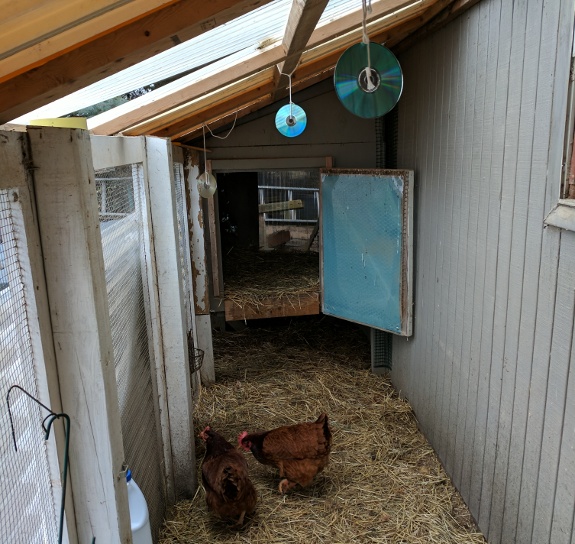
My Mom had a problem with
small birds stealing chicken feed from her flock.
The solution was to hang up
shiny CD's that scare small birds.
Back in the old days folks
would use an old pie tin in place of CD's.
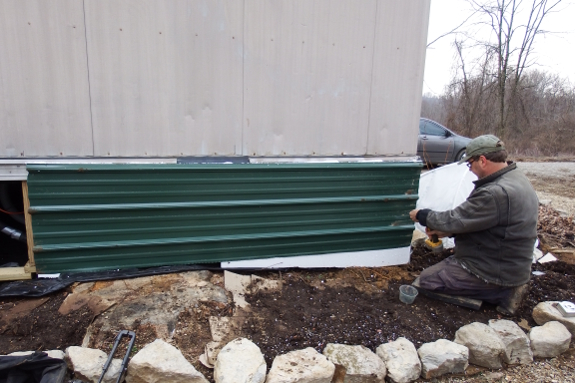
The last piece of
skirting metal went up far faster than the first did. On a few pieces
--- like this one --- we chose to cut the metal in a straight line
along the bottom rather than dealing with irregularites of the ground
since cutting across the metal ridges is very tricky. We'll backfill
dirt up against any gaps later to finish creating my planting beds,
which will make current irregularities disappear.
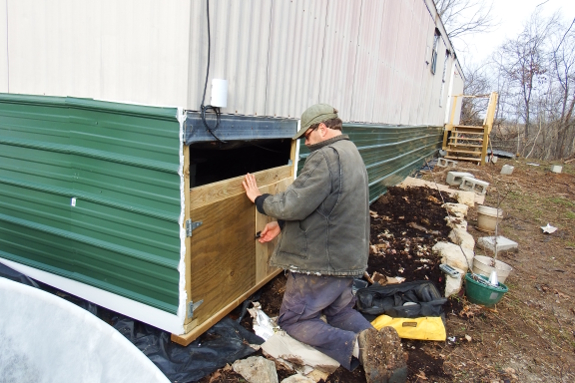
Next up is doors. We
left gaps for four of them and Mark's got the first one all framed up.
The top in this image will be a vent which is still bubbling to life
within his imagination, so stay tuned to see how it turns out!
Want more in-depth information? Browse through our books.
Or explore more posts by date or by subject.
About us: Anna Hess and Mark Hamilton spent over a decade living self-sufficiently in the mountains of Virginia before moving north to start over from scratch in the foothills of Ohio. They've experimented with permaculture, no-till gardening, trailersteading, home-based microbusinesses and much more, writing about their adventures in both blogs and books.
